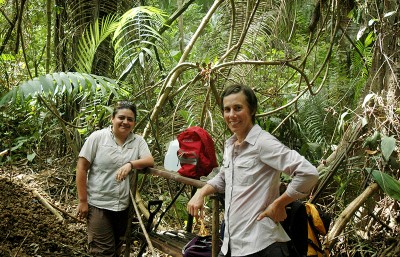
Jessica Munson (on right) with project co-director, Lorena Paiz.
Download Image: Web
The Archaeological Institute of America awarded Jessica Munson, Ph.D., assistant professor of Latin American archaeology, a $25,000 grant to conduct excavations at Altar de Sacrificios, a site located in the southern Maya lowlands of Guatemala. The AIA is the oldest and largest archaeology society in the United States and gives one Cotsen Excavation Grant every year to a first-time project director.
Munson is an assistant professor of Latin American archaeology and director of the Altar de Sacrificios Archaeological Project (ALSAP). Located at the confluence of three major rivers, the site was likely an important trading center and was occupied for nearly two millennia starting at about 900 BCE. Munson’s research focuses on the emergence of social inequality and will investigate how everyday people adapted to social and political changes during the Preclassic period (ca. 1000 BCE 200 CE).
The theme of social inequality and questions surrounding its emergence and consequences is widely recognized as a central topic of archaeological inquiry that has important contemporary relevance. Understanding how ancient societies responded and adapted to political changes and socioeconomic differences in the past can provide important lessons for addressing similar challenges in today’s society.
“This grant will allow us to expand on previous investigations, and will provide hands-on opportunities for students to gain field experience and learn about Maya cultural heritage,” said Munson, who laid the groundwork for the project last summer. “I am very excited to have support for this project, and for the opportunity to involve students in the research process.”
Starting this summer, students, professionals and local community members will begin excavating two residential areas to investigate settlement patterns, domestic life and the social experience of groups living beyond the site’s ceremonial center. The household data uncovered will provide a more complete picture of the pre-Hispanic city’s sustaining population, settlement patterns and domestic life. It will also add major substantive findings about the diverse social and economic factors that contributed to the emergence of status distinctions in early Maya society.
“We congratulate Dr. Munson for designing an interesting and essential project that will significantly expand our understanding of the ancient Maya,” said Ann Benbow, executive director of the Archaeological Institute of America.
The Cotsen Excavation Grants, which include a separate grant given to ongoing projects, are made possible through the generous support of Lloyd E. Cotsen, former AIA board member and chairman of the Cotsen Foundation for the ART of TEACHING and the Cotsen Foundation for Academic Research. To read more about the Cotsen Excavation Grants and other AIA grants and fellowships, please visit www.archaeological.org/grants.